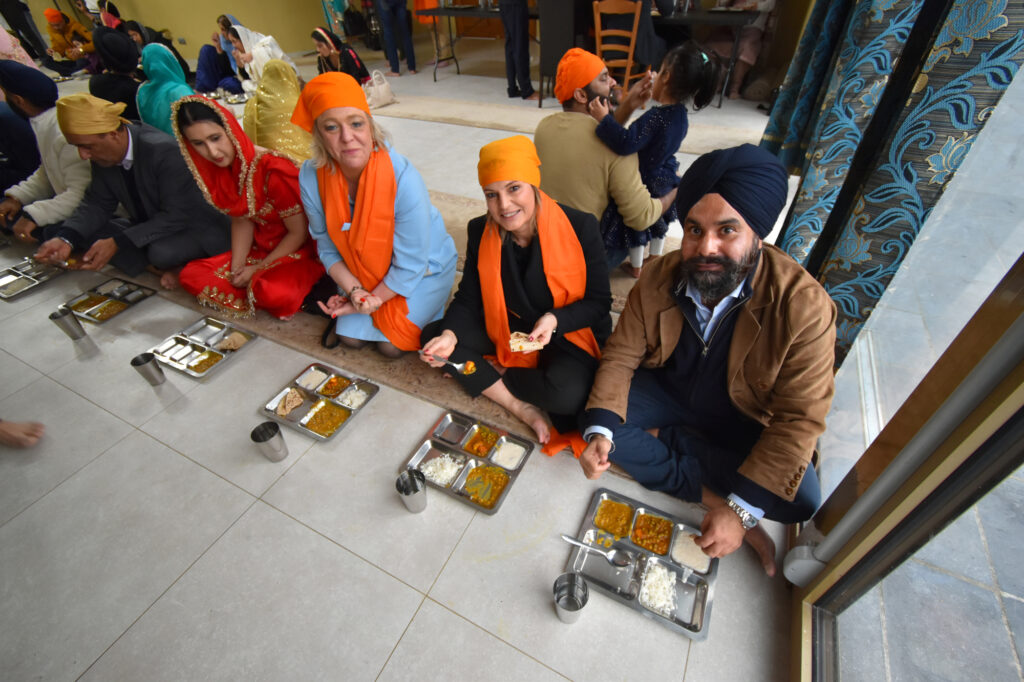Last Sunday, in a special Service organized in Sint Truiden (Belgium) by the European Sikh Organization and chaired by Binder Singh, a large gathering of Sikhs joined to listen to Ingrid Kempeneers (Mayor of Sint Truiden), Hilde Vautmans (Member of the European Parliament for Belgium) and Ivan Arjona (FoRB activist and Scientology representative to the EU institutions) about the need for Belgium and the European Union at large to fully recognize the Sikhism as a religion with full rights without discriminations from country to country.
Official and active support more than needed
After the welcome words from Mayor Kempeneers, MEP Vautmans explained to all the attendees that she had talked to the Belgium Minister of Justice about the recognition of the Sikh as a religious community and that “while it is a slow process”, the Minister affirmed to Vautmans that they “are reviewing everything that has been submitted to them”. After the MEP, was the turn of Scientology’s representative to the EU and UN, who expressed the support they wanted to give to the Sikh community because “no one in Europe should be discriminated against based on their religion or nationality.”
While having a Constitution respectful of religious freedom, Belgium has been blamed by the European Court of Human Rights, for having a discriminatory system of religious recognitions whereby they apply different tax models and funding models depending on the religion and which the application system for recognition does not follow a standard procedure with real requisites and instead it depends on the Minister of Justice deciding to send it to the Parliament, and then on the Parliament liking this religion or not, which in itself opens the door for discrimination and political decision rather than based on law and fundamental rights. It could be a good opportunity for the Minister of Justice to amend and fix the system, which would give a very good message at the continental level from the country that hosts the so-called capital of Europe.
Sikhism as a minority religion faces challenges in gaining recognition across Europe.
Except for Austria and some partial recognitions in other countries, its legal status remains unclear within many EU member states. Despite having a historical presence dating back to 20th century migrations Sikhs often encounter discrimination and religious expression restrictions that hinder their integration into European societies. Recognizing Sikhism as an organized religion it would strengthen protections enable the preservation of identity and align policies regarding minority faith groups with the core values of equality, pluralism and human rights upheld by the EU.
The Lack of Legal Safeguards for Minority Religions in the EU
Although religious freedom is considered a human right within the European Union (EU) individual countries govern this area directly. The EU Charter of Fundamental Rights safeguards liberty alongside conscience and thought. Moreover, mechanisms are in place within the EU to address discrimination and uphold relevant aspects of human rights law. However, minority groups like Sikhs can still face disadvantages due to a lack of national recognition despite these provisions.
Journey and Presence of Sikhs in Europe
Sikhism is a monotheistic religion that originated in the Punjab region of India around 1500 CE. It has gradually established its presence throughout Europe over time.
The core beliefs of Sikhism revolve around the devotion to a Divine power the congregation as the focal point of worship equality among all classes and genders truthful living and service to humanity. Presently there are 25 to 30 million Sikhs globally with a significant concentration in India and sizable communities in North America, East Asia, and Europe.
Sikhs have been a part of Europe’s religious landscape for over a century due to migration patterns linked to colonialism and conflicts. Early as the 1850s they began settling in port cities of the British Empire such as London and Liverpool as well as various parts of continental Europe. The world wars and subsequent upheavals in South Asia led to waves of displaced Sikhs seeking refuge in Europe with many establishing it as their permanent home. Currently, the largest Sikh populations can be found in the UK, Italy, and Germany.
However, despite residing in European Union (EU) states for generations now Sikhs often encounter hurdles when it comes to fully integrating into public life while also preserving their religious identity. For example, many Sikhs observe five symbols of faith which include uncut hair and beard; a comb; a steel bracelet; a sword; and an undergarment. Rules that restrict displays can pose challenges for wearing turbans or carrying kirpans (religious ceremonial swords). Additionally, without recognition or acknowledgement from institutions or employers alike fulfilling religious obligations such, as taking time off work or school for Sikh holidays can be quite demanding.
The lack of status for the Sikh population makes it challenging to accurately count their numbers, which in turn hinders policy advocacy and efforts to preserve their heritage. Moreover, without legal protections as a religious minority, Sikhs face an increased risk of discrimination and hate crimes. This can lead to a situation where Sikhs feel compelled to downplay signs of their identity to smoothly participate in society, which undermines the principles of pluralism.
To strengthen the rights of Sikhs it would be beneficial for Sikhism to be recognized officially as a religion at the EU level. Such recognition would help resolve any uncertainties regarding accommodations for Sikhs and bring them on par with major faiths in terms of public representation. It would also allow Sikhs to fully contribute both as practitioners and members of an ethnic minority. Importantly this recognition would affirm that diversity is a force that strengthens social cohesion rather than posing a threat.
While some European countries like the UK, Spain and the Netherlands have taken steps towards recognizing and integrating Sikhism, it is crucial for legal status and protection across all member states, within the Union. Issues can arise when a turban-wearing Sikh needs ID cards or driving licenses that align with their religious requirements. By obtaining recognition at the EU level necessary accommodations can be standardized to override any domestic discriminatory policies.
In addition to safeguarding the rights of minority groups embracing diversity also enhances the EU’s global influence by serving as a role model for human rights. Furthermore, the connections between nations and South Asia established through the Sikh diaspora contribute to social and developmental progress in their countries of origin. In summary, ensuring protection, for Sikhism aligns with the principles that shape the European Union project.
Sikhs in Europe: Building Bridges Between Communities Through Contribution and Interfaith Collaboration
Within the European landscape, Sikhs play a crucial role in enriching society and promoting interfaith harmony. They actively engage in all sorts of aspects, including education, philanthropy, cultural events, and political involvement thereby making significant contributions to their communities.

Contributions to Society
Sikh individuals residing in Europe make notable strides in fields such as education, academia, and entrepreneurship. By pursuing education, they actively contribute to the academic community through research and teaching. In the realm of business, they establish enterprises that not only create job opportunities but also contribute to economic growth.
Philanthropy and charity are deeply embedded within Sikh values with an emphasis on selfless service known as seva. Sikh organizations and individuals are extensively involved in activities that support those less fortunate while actively participating in social causes. The practice of exemplifies this commitment by providing free meals through community kitchens as an act of serving humanity.
Cultural Engagement
Sikhs take the initiative in organizing and participating in events aimed at celebrating their heritage while fostering a sense of community. These endeavours not only preserve Sikh traditions but also promote understanding and unity among diverse ethnicities and religious groups throughout Europe.
Interfaith Collaboration
Sikhs proactively engage in interfaith dialogues, conferences and events that facilitate discussions, on shared values and concerns among faiths. Sikhs actively participate in engagements that provide them with a platform to share their beliefs and learn about other faiths promoting mutual understanding.
Sikh individuals seize the opportunity of festivals and celebrations to engage with members of different denominations. By attending events organized by religious communities they foster a sense of shared celebration and build bridges between faith traditions.
In terms of community outreach Sikhs collaborate with representatives from religious denominations on a wide range of projects. These initiatives can include community service efforts or organizing charity events. This cooperative approach goes beyond boundaries addressing social issues and nurturing a sense of shared responsibility.
Another means for forging connections is through Sikh participation in interfaith prayer services. These services gather individuals from faith backgrounds who come together to pray for common goals, such as peace, justice, and harmony.
Education plays a role in promoting understanding among different religions. Sikhs actively engage in initiatives like seminars, workshops, and classes to enhance awareness about diverse faiths. Through these efforts, they contribute to fostering an environment characterized by tolerance and appreciation for diversity.
Social and cultural exchanges serve as components within the Sikh community’s strategy for interfaith engagement. They invite individuals from faiths to Sikh gurdwaras (places of worship) to actively participate in cultural events and strive to form friendships that transcend religious boundaries. All these efforts aim towards building bridges, between communities.
Recognized or not Sikhs don’t give up
In a world that celebrates diversity, Sikhs residing in Europe serve as an example of how communities can flourish through mutual respect, empathy, and cooperation. By engaging in interfaith activities and making valuable contributions to society Sikhs not only preserve their rich cultural heritage but also play a vital role in fostering understanding among people from different religious backgrounds. As Europe embraces its status as a hub, with various beliefs and traditions the Sikh community serves as a compelling reminder of the strength found in unity amidst diversity.
source link eu news










